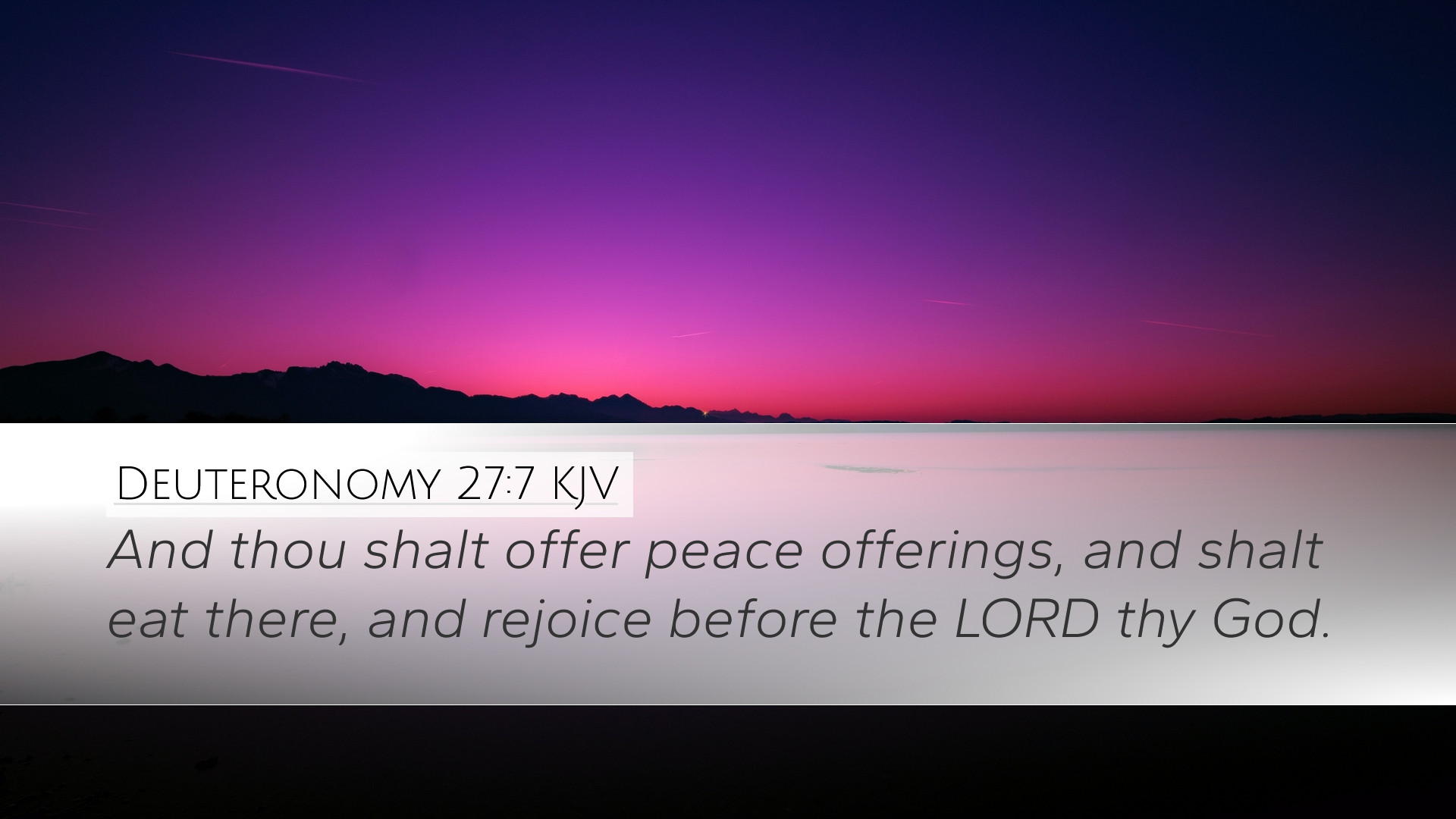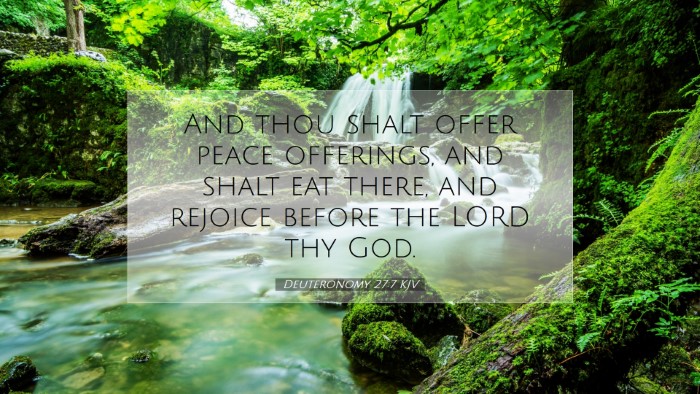Commentary on Deuteronomy 27:7
Verse: "And thou shalt offer peace offerings, and shalt eat there, and rejoice before the LORD thy God."
Introduction
This verse is a part of the larger context within Deuteronomy where Moses instructs the Israelites on their covenant responsibilities and the significance of worship and communal celebration. Deuteronomy 27:7 addresses the ritual of peace offerings, which carry deep theological and communal importance in Israelite worship.
Contextual Analysis
In Deuteronomy, Moses is reminding the Israelites of their covenant with God as they prepare to enter the Promised Land. The establishment of altars, the proclamation of blessings and curses, and the offering of sacrifices are integral to maintaining their relationship with God.
The Nature of Peace Offerings
Peace offerings, also known as fellowship offerings, are significant as they symbolize the restoration of the relationship between God and the worshiper. Matthew Henry notes that these offerings are distinct for their celebratory nature and the communal aspect they foster among the people.
- Purpose of Peace Offerings: The peace offering serves as a means of cultivating gratitude and as a response to divine favor.
- Commensal Aspect: Albert Barnes highlights the eating of these offerings as an act of joy and fellowship among worshipers, inviting communal participation in divine blessings.
- Divine Presence: Adam Clarke elucidates that the act of rejoicing before the Lord emphasizes God's abiding presence and the invitation to experience joy in worship.
Thematic Insights
This verse encapsulates themes important to both ancient Israel and contemporary believers, including joy in worship, the significance of community, and gratitude towards God.
1. Joy in Worship
Central to Deuteronomy 27:7 is the call to rejoice before God. Worship in the Old Testament is laden with emotions and expressions of joy. Matthew Henry articulates that joy is not merely a personal experience but a corporate expression of gratitude. Rejoicing signifies acknowledgment of God’s provisions and faithfulness.
2. Community and Fellowship
Worship was never intended to be an isolated act. The peace offerings were enjoyed in a communal feast, underscoring the social fabric of Israelite worship. Barnes emphasizes that such acts of communal eating foster bonds among the people as they gather in God’s presence, thus solidifying their identity as a covenant community.
3. Spiritual Significance of Sacrifices
The notion of sacrifice is pivotal in understanding the relationship between God and Israel. Adam Clarke notes that the act of offering stems from a desire to express gratitude and devotion. The peace offering reflects a desire for harmony with God and within the community, acting as a conduit of divine blessing.
Applications for Today
For pastors, students, and scholars, Deuteronomy 27:7 serves as a rich source for theological reflection and practical application in contemporary worship.
1. Encouragement in Worship Practices
This verse encourages modern congregations to foster joy in worship. It advocates for the inclusion of celebratory elements in church services, highlighting the importance of community and shared experiences within the body of believers.
2. Building Community Through Fellowship
The communal aspect of peace offerings can inspire today’s churches to prioritize fellowship. Activities that promote togetherness, such as shared meals and celebrations, can manifest the joy that comes from being in God’s presence collectively.
3. Understanding Sacrifice in Christian Life
Moreover, the significance of sacrifice transcends rituals and speaks to the heart of Christian discipleship. Understanding that our lives, like peace offerings, are to be presented before God for His glory and community well-being invites believers to live sacrificially in love and service.
Conclusion
Deuteronomy 27:7 encapsulates a profound invitation to joyfully engage in worship through communal offerings and sacrifices, reminding us of God’s grace and the importance of community. As we reflect on this verse and the insights from esteemed commentators like Matthew Henry, Albert Barnes, and Adam Clarke, may we cultivate an atmosphere of reverence, joy, and fellowship in our approach to God.


